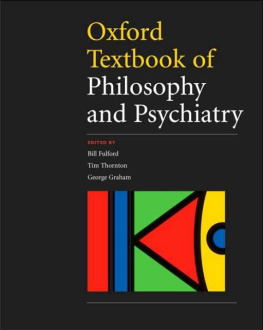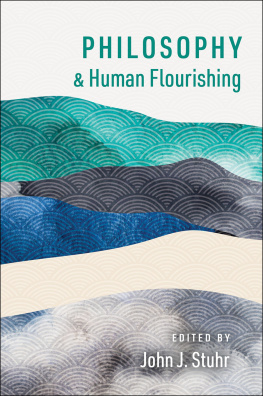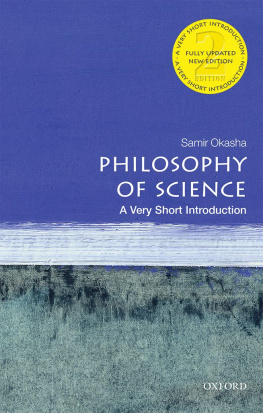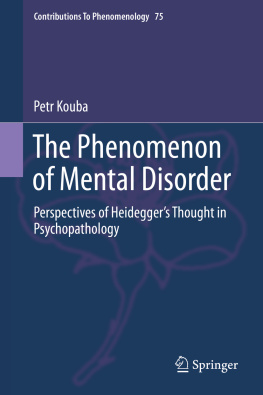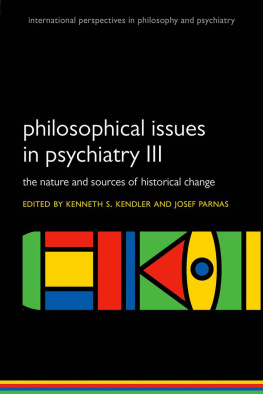Acknowledgements
All best efforts to find copyright holders have been made, but this has not always been possible. Please accept our apologies if we have infringed copyright in any way, and please contact the Medicine Editorial department of Oxford University Press.
2.1: Extract from page 9 of A Distinction is not a Dichotomy by H. Puttnam in The Collapse of the Fact/Value Dichotomy and Other Essays Cambridge Mass: Harvard University Press, Copyright 2002 by the President and Fellows of Harvard College
2.2: Extract from pages 11314 of The Myth of Mental Illness by T. S. Szasz in American Psychologist (15, 113118). Reprinted with permission from the American Psychological Association.
2.3: Extracts from pages 3056, 306, 309, 310, 314, and 315 of The concept of disease and its implications for psychiatry by R.E. Kendell in the British Journal of Psychiatry (127) (1975). Reprinted with permission from the Royal College of Psychiatrists.
4.1: Extracts from page 3 of A Plea for Excuses by J. L. Austin in Proceedings of the Aristotelian Society Vol. LVII (19567). Reprinted by courtesy of the Editor of the Aristotelian Society: 19567.
4.2: Extract from pages 46 of the Introduction from J. L. Austin by G. J. Warnock (1989). Reprinted with permission from Routledge.
4.3: Extract from pages 4968 of On the distinction between disease and illness by C. Boorse in Philosophy and Public Affairs (5) (1975). Reprinted with permission form Blackwell Publishing.
4.4: Extracts from pages 1747 and 1845 of The Body as Expression of Speech in Phenomenology of Perception by Maurice Merleau-Ponty (trans. Colin Smith) (1962). Reprinted with permission from Routledge.
4.5: Extract from pages xlvxlvi of Introduction: The Pursuit of Being in Being and Nothingness by Jean-Paul Sartre (trans. Hazel E. Barnes) (1956). Copyright 1956 Philosophical Library. A Citadel Press book. All rights reserved. Reprinted by arrangement with Kensington Publishing Corp.
4.6: Extract from pages 37 and 412 of Hermeneutic Method and Reflective Philosophy in Freud and Philosophy by Ricoeur (trans. D. Savage 1970). Reprinted with permission from Yale University Press.
4.7: Extract from pages 4344 and 48 of Real People: Personal Identity Without Thought Experiments by K. V. Wilkes (1988). Reprinted with permission from Oxford University Press.
5.3: Extract from pages 389 of The Runabout Inference-Ticket by A. N. Prior in Analysis (21) (1960). Reprinted with permission form Blackwell Publishing.
6.1: Extract from pages 2379 of The Value of Philosophy in The Problems of Philosophy by Bertrand Russell (1912). Reprinted with permission from Oxford University Press and the Bertrand Russell Peace Foundation.
6.2: Extract from pages xx of section 6.517 in Tractatus Logico-Philosophicus by Ludwig Wittgenstein (trans. D. F. Pears and B.F. McGuinness) (1981). Reprinted with permission from Routledge.
6.3: Extract from page 9 of the Introduction to An Inquiry into Meaning and Truth, the William James lectures delivered at Harvard University by B. Russell (1940). Penguin Books 1962. Reprinted with permission of Taylor & Francis and the Bertrand Russell Peace Foundation.
6.4: Extract from page 23 of The Archimedean Point in Ethics and the Limits of Philosophy by B Williams Cambridge Mass: Harvard University Press, Copyright 1985 by Bernard Williams.
6.5 & 6.6:Extract from pages 11117 and 1216 of Language of Morals by R. M. Hare (1972). Reprinted with permission from Oxford University Press.
6.7: Extract from pages 834 and 97100 from Moral Beliefs by P. Foot in PAS 59 (1958/9). Reprinted by courtesy of the Editor of the Aristotelian Society: 1958/9.
6.9: Extracts from pages 9596, 9697, 100, and 101 of The Construction of Definitions of Illness in Symptoms and Illness: The Cognitive Organisation of Disorder by D. Locker (1981). Reprinted with permission from Routledge.
6.10: Extract from pages 115119; of Illness in Action from Moral Theory and Practice by K. W. M. Fulford (1989). Cambridge University Press. Reproduced with permission of the author and publisher.
6.11: Extracts from pages 623;, 63, 6667;, 7071; of The Body in The Meaning of Illness: A Phenomenological Account of the Different Perspectives of Physician and Patient by S. Kay Toombs (1993). Reprinted with kind permission from Springer Science and Business Media.
6.12: Extract from pages 1267; of Illness in Action from Moral Theory and Practice by K. W. M. Fulford (1989). Cambridge University Press. Reproduced with permission of the author and publisher.
6.13: Extract from pages 1356; of Illness in Action from Moral Theory and Practice by K. W. M. Fulford (1989). Cambridge University Press. Reproduced with permission of the author and publisher.
6.14: Extract from page 3 of A plea for excuses by J. L. Austin in PAS 57 (19567;). Reprinted by courtesy of the Editor of the Aristotelian Society 19567;.
7.1: Extract from page 7 of Matters Historical in The History of Mental Symptoms by G. E. Berrios (1996). Reprinted with permission from G. E. Berrios and Cambridge University Press.
7.2: Extract from opening page of Mental Health in Plato's Republic by A. J. P. Kennedy The British Academy 1970. Reproduced by permission from Proceedings of the British Academy 55; 1969.
7.3: Extract from pages 2878; of The Stoic Conception of Mental Disorder: The Case of Cicero by L. Nordenfelt in Philosophy, Psychiatry & Psychology (1997; 4:4). The John Hopkins University Press. Reproduced with permission of The John Hopkins University Press.
7.4: Extract from Wild Beasts and Idle Humors by Daniel Robinson, p.325, Cambridge, Mass,: Harvard University Press, Reprinted by permission of the publisher. Copyright 1996 by the President and Fellows of Harvard College 7.5 & 7.6: Extracts from Malleus Maleficarum Kramer, H & Sprenger, J (1996) trs by Summers, M
7.7: Extract from pages A History of Medical Psychology by Gregory Zilboorg and George W. Henry. Copyright 1941 by W. W. Norton & Company, Inc. Copyright renewed 1969 by Margaret Stone Zilboorg and George W. Henry. Used by permission of W.W. Norton & Company, Inc.
7.8: Extract from page 325 of A History of Psychiatry, Edward Shorter (1997). Copyright 1997 John Wiley and Sons Ltd. Reproduced with permission.
8.1: Extract from Jaspers, K Causal and Meaningful Connections between Life History and Psychosis (an extract from Jaspers, K (1913) Kausale und verstndliche Zusammenhnge zwischen Schicksal und Psychose bei der Dementia praecox (Schizophrenie), Z Neurol, 14, 158263;, trs Hoenig, J in Hirsch, S R & Shepherd, M (1974) Themes and Variations in European Psychiatry
8.2: Extract from pages 131323; of The Phenomenological Approach in Psychopathology by K. Jaspers (anon. trans of Die Phnomenologische Forschungrichtung in der Psychopathologie) in the British Journal of Psychiatry (114) (1968). Reprinted with permission from the Royal College of Psychiatrists.
9.1: Extract from pages 131323; of The Phenomenological Approach in Psychopathology by K. Jaspers (anon. trans of Die Phnomenologische Forschungrichtung in der Psychopathologie) in the British Journal of Psychiatry (114) (1968). Reprinted with permission from the Royal College of Psychiatrists.
9.2: Extract from pages 248266; of Logical Investigations, Volume II by Edmund Husser (trans. J. N. Findlay) (1970). Reprinted with permission from Routledge.
10.2: Extract from Jaspers, K Causal and Meaningful Connections between Life History and Psychosis (an extract from Jaspers, K (1913) Kausale und verstndliche Zusammenhnge zwischen Schicksal und Psychose bei der Dementia praecox (Schizophrenie), Z Neurol, 14, 158263;, trs Hoenig, J in Hirsch, S R & Shepherd, M (1974) Themes and Variations in European Psychiatry

